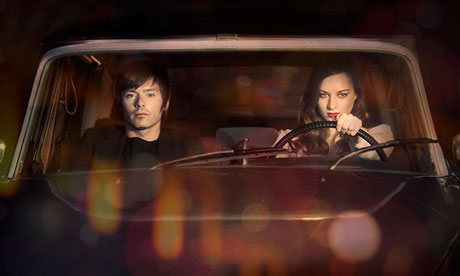 If you like the thought of the dreamy, synth pop of French duo Air (“Sexy Boy”) mixed with the more angular, detached malaise of London’s New Young Pony Club (“Ice Cream”) then Tomorrow’s World’s eponymous debut album will be right up your darkly lit, probably by some French auteur, alleyway. This is mainly because Lou Hayter and Jean Benoit Dunckel are in fact the keyboardist in New Young Pony Club and half of Air respectively. Lou Hayter sings with precision and grace on every track here and the whole thing sounds pretty much how you would like it to and expect it to given the artists involved.
If you like the thought of the dreamy, synth pop of French duo Air (“Sexy Boy”) mixed with the more angular, detached malaise of London’s New Young Pony Club (“Ice Cream”) then Tomorrow’s World’s eponymous debut album will be right up your darkly lit, probably by some French auteur, alleyway. This is mainly because Lou Hayter and Jean Benoit Dunckel are in fact the keyboardist in New Young Pony Club and half of Air respectively. Lou Hayter sings with precision and grace on every track here and the whole thing sounds pretty much how you would like it to and expect it to given the artists involved.
The best tracks certainly recall early, peak period Air along with, and possibly because of, the cross-cultural mix of French and English, the work that they did with Charlotte Gainsbourg. “Life on Earth” is a doppelgänger for Gainsbourg’s “5:55” and the sweet and sour drunkenness of “Pleurer et Chanter”, the only French language song and a definite highlight, could have featured on either of her last 2 albums. “Metropolis” could be from “Moon Safari” and wouldn’t have affected the consistently high quality of Air’s debut album and “Drive” has a guitar lick and kick that immediately recalls Hayter’s work with New Young Pony Club. “You Taste Sweeter” is vocally and sonically early Ladytron to a T (“Sugar” anyone?) and “Don’t Let Them Bring You Down”, a plaintive, piano-led ballad is very Twin Peaks and the kind of song that, this time around, Donna Heyward could have sung to James Hurley whilst simultaneously crying at the Bang Bang Bar.
It’s only on the muddy, crawling “Catch Me” where Hayter, sharing the chorus with Dunckel, pleads ‘Dark Angel, take me away’ that a sound begins to emerge that could be considered as belonging to “Tomorrow’s World” and not referencing their own work or, at least not obviously, that of any other artist. The album ends with the yearning “Inside” which appears to be a tribute to Julee Cruise’s enormously influential “Mysteries of Love” with the final two minutes morphing into a stuttering, repetitive malfunctioning computer that wouldn’t have dared disturb the calm of Cruise’s ballad. It’s a perfect closer and the only other example here of Hayter and Dunckel creating something more unique to them, at least in sound if not content.
Even though the duo are guilty of overusing core elements and sounds lifted from their past work to a greater or lesser degree in almost every track here, this is to a certain degree unavoidable and is also responsible, in part, for creating some of the gorgeous, hazy cinematic passages here which I would strongly urge you to seek out. A few more dark angels though and they’ll have their very own, new, world to inhabit, one I would love to experience.


